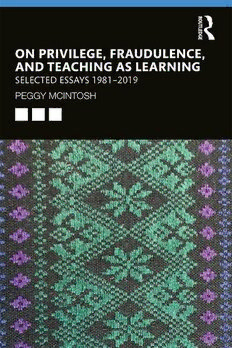Table Of ContentON PRIVILEGE, FRAUDULENCE, AND
TEACHING AS LEARNING
From one of the world’s leading voices on white privilege and anti-racism work
comes this collection of essays on complexities of privilege and power. Each of
the four parts illustrates Peggy McIntosh’s practice of combining personal and
systemic understandings to focus on power in unusual ways. Part I includes
McIntosh’s classic and influential essays on privilege, or systems of unearned
advantage that correspond to systems of oppression. Part II helps readers to
understand that feelings of fraudulence may be imposed by our hierarchical
cultures rather than by any actual weaknesses or personal shortcomings. Part III
presents McIntosh’s Interactive Phase Theory, highlighting five different world
views, or attitudes about power, that affect school curriculum, cultural values,
anddecisions ontaking action.Thebookconcludeswithpowerfulinsightsfrom
SEED, a peer-led teacher development project that enables individuals and
institutions to work collectively toward equity and social justice. This book is
the culmination of forty years of McIntosh’s intellectual and organizational
work.
PeggyMcIntosh, Ph.D. is Senior Research Scientist of the Wellesley Centers
for Women at Wellesley College in Massachusetts. She has taught at the
Brearley School, Harvard University, Trinity College (Washington, D.C.), the
Universityof Denver, the University of Durham (UK), and WellesleyCollege.
She is Founder of the National SEED Project on Inclusive Curriculum
(Seeking Educational Equity and Diversity) which she co-directed with Emily
Style during the Project’s first twenty-five years. McIntosh is author of forty
book chapters and articles, including the seminal paper “White Privilege:
Unpacking the Invisible Knapsack.” She consults widely in the United States
and throughout the world with organizations and educators who are creating
more gender-fair, multicultural, and relational workplaces and schools.
“It is rare that one gets the chance to meet or read in one’s lifetime the origi-
nator of a new way of thinking or believing in the world of ideas. The legend-
ary Peggy McIntosh is such a transformative figure. Her work is fundamental
and foundational to our thinking on white privilege, and the subtle and myriad
waysthatraceoperatestotheadvantageofwhitefolkwhiledenyingbenefitand
advantage tononwhitepeople. Sheisalsoonparwiththemostgiftedtranslators
of complicated ideas and complex concepts we have had in a generation, and
millions of people can trace their thinking about whiteness and privilege to her
lucid and creative essays. Peggy McIntosh is a national treasure, and this pow-
erhouse collection of her finest thinking and most brilliant reflections over the
last few decades will solidify her sui generis stature as an American Original.”
—Michael Eric Dyson, Professor of Sociology, Georgetown University
“What a gift to have this collection of Peggy McIntosh’s papers! She has been a
foundational leader who has already transformed our thinking and teaching, but
her work will now be available to new audiences. This collection of her essays
gives us her long-range view of white privilege, fraudulence, and the advance-
ment of education through inclusion. Her work can now inspire new genera-
tions of thinkers, teachers, social justice advocates, and anyone dreaming of a
more just world.”
—Dr. Margaret L. Andersen, Rosenberg Professor of
Sociology Emerita, University of Delaware
“This collection serves as a reminder that systemic power and privilege are
weakened when we reignite our humanity’s natural curiosity, vulnerability, and
longing for one another’s well-being. Where whiteness pressures us to be experts
produced by hierarchical systems and structures, these essays invite us to consider
theworld ofknowledge we tap into whenwe remaingroundedin one another’s
life experiences and inner knowledge. This compilation is a call to co-create a
more humane and connected world.”
—Debby Irving, Racial Justice Educator and Writer
“Peggy McIntosh’s transformative thought is deep, engaging, and vitally impor-
tant for our times.”
—Hugh Vasquez, National Equity Project
“These writings reveal the heart and mind of a great student of life, a great
teacher, and revolutionary social thinker. Her contribution to emerging social
justice discourse is incalculable.”
—Victor Lee Lewis, Radical Resilience Institute
ON PRIVILEGE,
FRAUDULENCE, AND
TEACHING AS LEARNING
–
Selected Essays 1981 2019
Peggy McIntosh
Firstpublished2020
byRoutledge
52VanderbiltAvenue,NewYork,NY10017
andbyRoutledge
2ParkSquare,MiltonPark,Abingdon,OxonOX144RN
RoutledgeisanimprintoftheTaylor&FrancisGroup,aninformabusiness
©2020PeggyMcIntosh
TherightofPeggyMcIntoshtobeidentifiedasauthorofthisworkhasbeen
assertedbyherinaccordancewithsections77and78oftheCopyright,
DesignsandPatentsAct1988.
Allrightsreserved.Nopartofthisbookmaybereprintedorreproducedor
utilisedinanyformorbyanyelectronic,mechanical,orothermeans,now
knownorhereafterinvented,includingphotocopyingandrecording,orin
anyinformationstorageorretrievalsystem,withoutpermissioninwriting
fromthepublishersortheauthor.Inaddition,PeggyMcIntoshretainssole
righttolicense,reproduce,orreprintallmaterialpublishedpriorto2019.The
originalpublicationdatesarefoundinthechapterreferences.Readersare
urgedtocitepreviouslypublishedmaterialaccuratelywithregardtooriginal
publicationdates.
Trademarknotice:Productorcorporatenamesmaybetrademarksorregistered
trademarks,andareusedonlyforidentificationandexplanationwithout
intenttoinfringe.
IllustrationsbyShebaniRao
LibraryofCongressCataloging-in-PublicationData
Acatalogrecordforthistitlehasbeenrequested
ISBN:978-0-8153-5404-8(hbk)
ISBN:978-0-8153-5411-6(pbk)
ISBN:978-1-351-13379-1(ebk)
TypesetinBembo
byTaylor&FrancisBooks
I dedicate this book to its readers.
I give it to you in appreciation, solidarity, respect, and
friendship.
CONTENTS
List of Contributors xi
Acknowledgments xiii
An Opening Letter 1
PARTI
The Privilege Papers 5
A Letter about the Privilege Papers 7
1 White Privilege and Male Privilege: A Personal Account of
Coming to See Correspondences Through Work in
Women’s Studies (1988) 17
2 White Privilege: Unpacking the Invisible Knapsack (1989) 29
3 Some Notes for Facilitators on Presenting My White
Privilege Papers (2004, 2018) 35
4 Selection from “White Privilege, Color and Crime: A
Personal Account” (1998) 39
5 Selection from “White Privilege: An Account to Spend”
(2009) 49
6 White People Facing Race: Uncovering the Myths that Keep
Racism in Place (2009) 55
viii Contents
PARTII
The Fraudulence Papers 61
A Letter about the Fraudulence Papers 63
7 Feeling Like a Fraud, Part I (1985) 67
8 Selection from “Feeling Like A Fraud, Part II” (1989) 81
9 Selection from “Feeling Like a Fraud, Part III: Finding
Authentic Ways of Coming into Conflict” (2000) 95
10 Feeling Like A Fraud, Part IV: The Psyche As Singular and
Plural (2019) 107
PARTIII
The Phase Theory Papers 119
A Letter about Phase Theory 112211
11 The Study of Women: Implications for Reconstructing the
Liberal Arts Disciplines (1981) 127
12 Interactive Phases of Curricular Re-Vision: A Feminist
Perspective (1983) 131
13 Selection from “Interactive Phases of Curricular and Personal
Re-Vision with Regard to Race” (1990) 151
PARTIV
The SEED Project Papers 167
A Letter about the National SEED Project 169
14 Selection from “Faculty-Centered Faculty Development”
(1994) by Peggy McIntosh and Emily Style 175
15 Selection from “Social, Emotional, and Political Learning”
(1999) by Peggy McIntosh and Emily Style 181
16 Selection from “Teacher Self-Knowledge: The Deeper
Learning” (2015) by Peggy McIntosh, Hugo Mahabir, Bob
Gordon, and Ruth Mendoza 189
Contents ix
PARTV
Closing 203
A Closing Letter 205
Further Reading 209
Index 217

